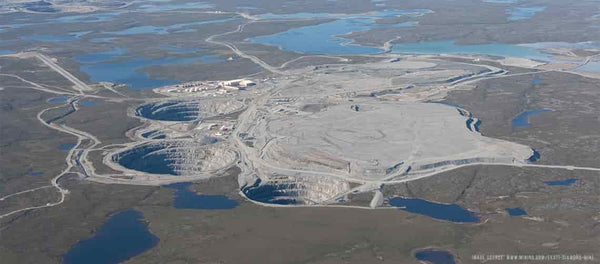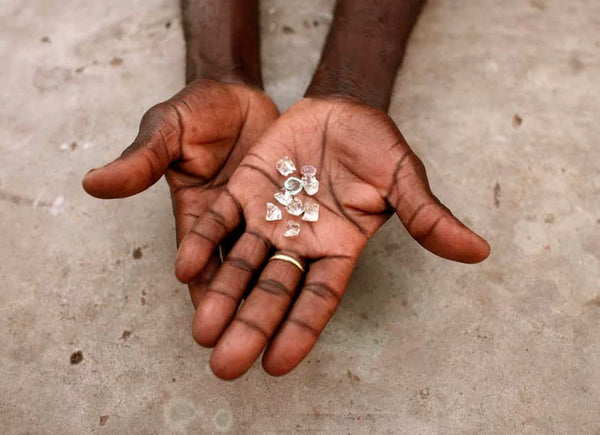Why are Lab Grown Diamonds Better For the Planet?
We tend to take earth’s natural resources, indigenous communities, beautiful nature and wildlife for granted. We use up resources and have limited ways of replenishing those resources or at least finding alternatives. When it comes to fine jewelry, we’re so glad that lab grown diamonds are available as an earth-friendly, conflict-free option for consumers. There are many reasons to love lab-grown diamonds, but to celebrate Earth Day, we’re sharing a few of our favorites.
1. There is no damage to animals or wildlife when creating lab-grown diamonds.
In some diamond mining regions, miners have been known to reroute rivers and construct dams, exposing riverbeds for mining, causing adverse effects to local fish and wildlife (BDI). In Zimbabwe, experts took samples of water from both the Odzi and Save rivers, after they found cattle were dying and locals bathing in the rivers were developing rashes on their bodies. The experts found high levels of nickel and chromium were being dumped in the river by nearby diamond mining companies. Canadian diamond mines who call themselves ‘conflict-free’ are far from that. They’re often built in areas where the environment houses fragile ecosystems of wildlife and nature.

When these ecosystems are disturbed, there is a serious ecological impact. Wildlife such as caribou, wolverine, bears, ptarmigan and fish which provide food for native communities, are affected by the mining. Lab-created diamonds do not pose this threat to wildlife. Additionally for earth-mined diamonds, people have to mine the diamonds where they’re located. If they happen to be under a river or stream, that’s where miners have to excavate them. Whereas with lab-grown diamonds, the labs can be built anywhere, and they don’t need to interfere with wildlife.
2. Less energy is used when creating lab-grown diamonds than extracting earth-mined diamonds.
Water usage and air pollution are major issues already negatively affecting our planet, but with the mining of diamonds, these issues are exacerbated. According to The Greener Diamond, in order to find a 1.0ct earth-mined diamond, nearly 1,750 tons of earth needs to be extracted. In 1920, the average diamond center stone size for an engagement ring was 0.30ct. In today’s market, that average has jumped up to a 1.25ct center stone.
According to the 2014 Environmental Impact Assessment by Frost and Sullivan, the water usage for creating lab-grown diamonds is 7 x less than the water usage for excavating earth-mined diamonds, 70 liters/carat for lab-grown versus 480 liters/carat for earth-mined. Additionally for air pollution, lab-grown diamonds produce 0.028 grams of carbon emissions/carat, whereas earth-mined diamonds produce 37,000 grams/carat. In comparison, you can see that the impact of lab-grown diamonds is so much less than that of earth-mined diamonds.

Photo Source: Courtesy of Mining.com via The Greener Diamond
3. Consumers don’t have to worry about negative humanitarian impacts, because their lab-grown diamond jewelry is 100% conflict-free.
Our charity foundation, The Greener Diamond, says that since World War II, it is estimated that there have been more than 150 wars. Studies show that 80% (120) of these wars have been civil wars in developing countries mostly funded by natural resources such as diamonds. Deaths from diamond-fueled civil wars in these countries have been 8 x greater than all US military deaths in the last 70 years combined. Exploration and diamond mining disrupt the lives of native people and the regional economy. Although it’s the locals who are impacted and suffer the most, then don’t often reap any of the financial benefits from the mining.

When you purchase conflict-free lab-grown diamonds, there is no negative humanitarian effect. Furthermore, we provide full transparency and can tell you the exact source of your lab-grown diamond, and we can even dig deeper and share with you the process of how it was created right here in the United States.
We’re proud to provide customers with a socially-conscious alternative to traditional earth-mined diamonds. On this Earth Day, we pledge to do all we can in the coming year to give back to diamond mining communities and our beautiful planet. Interested in seeing our progress and new projects being launched in 2019? Make sure you follow our partner foundation, The Greener Diamond for all updates!


